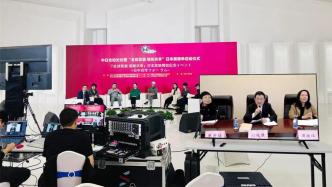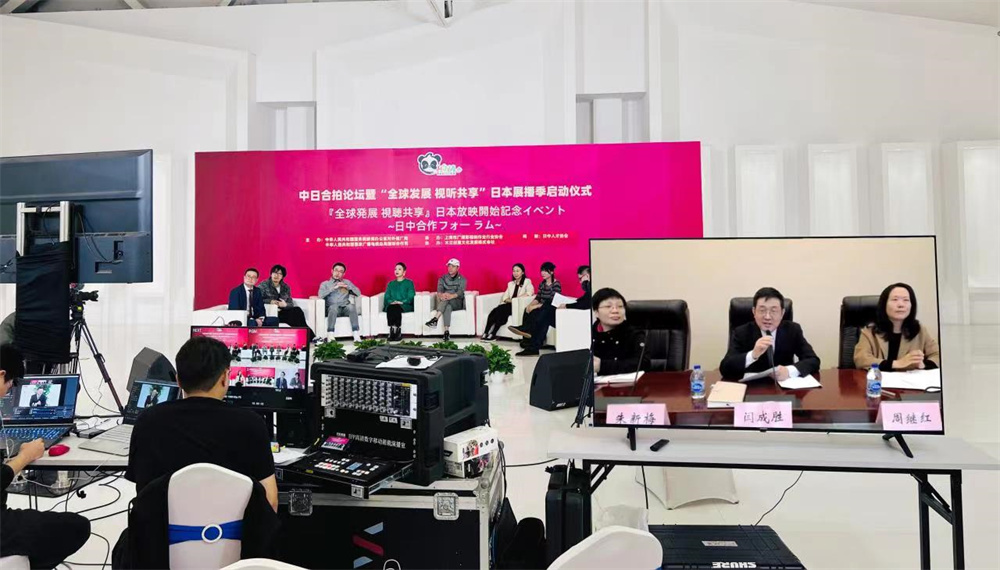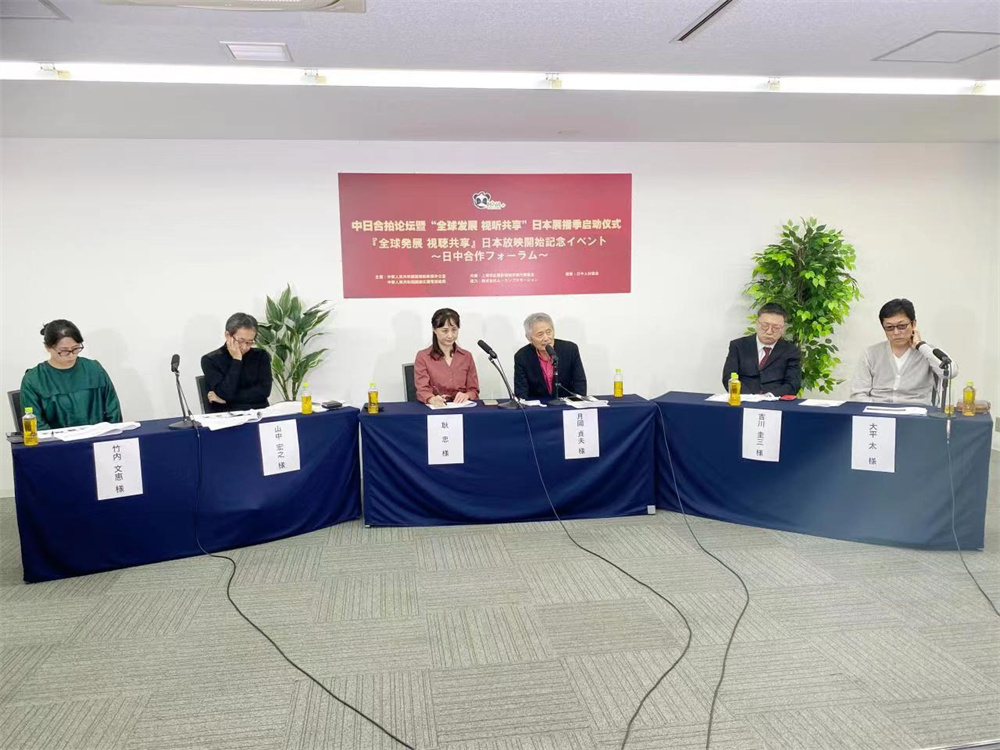
This year marks the 50th anniversary of the normalization of diplomatic relations between China and Japan. In order to promote cultural exchanges and cooperation between China and Japan, on October 28, it was hosted by the External Promotion Bureau of the State Council Information Office and the International Cooperation Department of the State Administration of Radio and Television, and undertaken by the Shanghai Radio, Film and Television Production Industry Association. , the "2022 Tokyo International Film and Television Festival Exhibition - China Joint Booth" participated by many domestic film and television institutions held the launching ceremony of the "China-Japan Co-production Forum and 'Global Development Audio-Visual Sharing' Japan Exhibition Season". The event is a combination of online and offline, connecting in Beijing, Shanghai, Hong Kong, and Tokyo. Representatives from the Chinese and Japanese film and television industries discuss the development and future of Chinese and Japanese film and television.

Forum Shanghai Venue

Japanese guests
Tokyo International Film Festival and Exhibition (TIFFCOM) is one of the important film and television exchange platforms in Asia. In 2021, there will be group exhibitors from 313 countries/regions, 2,536 business negotiations, and the on-site turnover will exceed 211 million yuan. Due to the impact of the epidemic, it will be held online in 2022. The Shanghai Radio and Film Production Industry Association has led the organization of 32 well-known domestic film and television institutions to participate in the exhibition in the form of a joint China booth. The types of promotion content cover film and television dramas, documentaries, animation, columns, Internet , distribution, post-production, metaverse, and more.
Fifty years ago, China and Japan normalized their diplomatic relations, opening a new chapter for exchanges and cooperation in the audio-visual industry between the two countries. In 1973, Nippon Television (NTV) produced the Japanese version of the TV series "Water Margin" as a gift for the normalization of diplomatic relations between the two countries. In 1980, China Central Television (CCTV) and the Japan Broadcasting Association (NHK) jointly produced the documentary "Silk Road", setting off a "Silk Road fever" in Japan. Over the past 50 years, China-Japan film and television exchanges and cooperation have continued to deepen, and mutual learning and mutual learning have become increasingly close. Chinese people are deeply impressed by the excellent Japanese film and television works such as "Tokyo Love Story", "Conan" and "The Lonely Gourmet". Chinese TV works such as "Romance of the Three Kingdoms", "Langya Bang" and "I'm Good in Another Country" are also loved by the Japanese people.
During this year's Tokyo Film and Television Festival, with the joint efforts of the audio-visual institutions of the two countries, 24 excellent Chinese audio-visual works such as "Beyond", "The Best Taste in the World", "You and Me in the City" and other excellent Chinese audio-visual works will be launched in Japan Satellite Theater, Galaxy Channels, BS11 and other TV media, and new media platforms such as Amazon Japan, through these vivid pictures and delicate and touching stories, allow Japanese audiences to have a deeper understanding of China's past, present and future.
Professional exchanges between film and television practitioners from both sides are an important part of the series of activities at the China Joint Booth. The China-Japan Co-production Forum is themed with "cooperation, development, and future". The audio-visual industry in China and Japan jointly discussed film and television exchanges and cooperation, especially the topic of co-production.
Chinese producer, film critic and founder of Jingshu Culture Fujii Shu believes that no matter what the theme is, "the most important thing is that the story has local characteristics and the emotion is real and can resonate. Don't deliberately emphasize the attributes of co-production and the perspective of foreigners. We will produce works that can be enjoyed by both audiences.” Taihei Tai, a famous Japanese film and television producer, revealed that Chinese comedies have a considerable market in Japan. Fumie Takeuchi, the producer of Japan’s Asmik Ace Co., Ltd., who brought “Dog King” to the Beijing International Film Festival not long ago and received enthusiastic responses, believes that “in terms of content, it is best to provide things that are common to the whole world. But at the same time, it is necessary to reflect the difference in culture and find a balance between the two." Sun Yunting, a screenwriter and producer, also said that Japanese dramas are rich in themes. In addition to historical themes, "Japanese dramas in the life stream have a very large proportion and are also very popular among Chinese audiences. Welcome, because the relationship between the characters and the storyline are not the same as the life in China, the audience will have a sense of freshness. Therefore, China has remade a lot of Japanese IPs, but only by being similar in spirit, not just in appearance, and based on Chinese culture. It is necessary to 'remake' rather than 'translate', so that the advantages of both sides can be integrated."
All the guests at the meeting believed that China and Japan have great similarities and complementarities in culture, and there is a lot of room for cooperation between the two sides.
At the forum, guests from both sides also had a positive discussion on the differences and cooperation possibilities of animation production between China and Japan. The animation genre has a huge market in both China and Japan. The first foreign TV animation introduced in China, the founder member of "Astro Boy", Tsukioka Sadao said at the forum, "In fact, in "Astro Boy" Before "Wood", Japan had created animations originating from China's "Journey to the West", which can be regarded as a long-standing relationship." He believes that there is a lot of room for Sino-Japanese animation cooperation in the future. "China uses a lot of CG technology, and Japanese audiences I am more accustomed to watching 2D animation, so the usage rate of this technology in Japan is only about 15%, but now there is also a heated discussion in Japan on 'whether more technology will destroy the content'." Vice Chairman of Shanghai Animation Industry Association Yuan Feng, the chairman and chairman of Shanghai Foch Film and Television Company, said that Chinese audiences are very open, "They will not stick to a certain form of animation. As long as the film is good, they can accept it. In the future, the integration of 2D and 3D technology may be more There is room for development.” Yu Wei, CEO of Burning Mai Technology Co., Ltd., who has participated in many Sino-Japanese copyright cooperation before, believes that the Metaverse is expected to become a breakthrough for the cooperation between the two parties. To communicate without barriers.”
In addition, Sino-Japanese cooperation in documentaries, variety shows, etc. also aroused the interest of the guests present at the scene. Zhu Xiaoqian, Deputy Director of Shanghai Radio and Television Documentary Center, and Yamanaka Hiroyuki, Senior Producer of Japan's NHK Entertainment Division, respectively elaborated on the possible cooperation between Sino-Japanese documentaries, Sino-Japanese variety shows and concerts. Zhu Xiaoqian believes that both Shanghai-style documentaries and Japanese documentaries are good at telling "the fate of small people in a big era", and they like to "do not set expectations and follow the film with an open mind" when shooting. These similarities make Sino-Japanese documentaries co-produced a lot. Space; Yamanaka Hiroyuki took concerts as an example, and believed that virtual singers who are popular among young people in China and Japan can strengthen exchanges and cooperation, because "music can best cross borders".
Yu Zhiqing, Secretary-General of Shanghai Radio and Film Production Industry Association, hoped that China and Japan can share experience and deepen cooperation in new fields such as film and television shooting location cooperation, copyright development and protection, and promote the common development of the film and television industries of the two countries. The association will Provide quality service for co-production.
The director of the chairman's office of Dowan Guoyuan Co., Ltd., the famous producer Keizan Yoshikawa, and the director of Bilibili's copyright business in Japan, Gao Yangfan, also exchanged speeches in the fields of Sino-Japanese copyright cooperation and overseas distribution.


